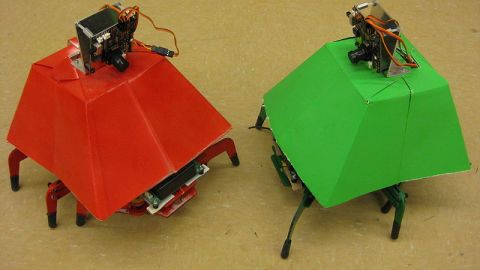Can Robots Replace the Natural World?

First off, yes, it’s entirely possible that we’ve watched too many science-fiction movies, like I, Robot and the Matrix. But a variety of new scientific innovations, particularly in the world of micro-robotics, have people asking if robots may eventually assume more of the responsibilities normally reserved for the natural world. No discussions of a cyborg uprising yet, but the future could very well see a change in how the organic world operates.
With the online revolution mostly behind us, scientists have begun focusing on the evolution of micro-robotics. That includes the recent unveiling of the I-SWARM (Intelligent Small-World Autonomous Robots for Micro-Manipulation), a new solar-powered, three-legged droid less than 4mm long and engineered to work cooperatively, like insects. While I-SWARM’s functionality hasn’t been discussed in detail, researchers at Harvard are developing housefly-sized robots that could potentially pollinate crops in the face of a shrinking bee population. The recipients of a $10 million grant, the micro-robots aren’t intended to take over the tasks of nature, but could eventually do that anyway.
The idea of robots replacing nature isn’t that unusual, or even that new. As far off as 2000, Stanford University hosted a discussion entitled “Will Spiritual Robots Replace Humanity by 2100?” More recently, doctors have analyzed human response to interacting with the artificial alternative to a natural phenomenon, citing playing with a robotic dog instead of a real dog as an example. In their observations, some doctors have found that the human response to both the real dog and robotic dog were remarkably similar.
With the U.S. military integrating robots in jobs once done by humans, some psychologists have already begun expressing concern for the human race should robotics take over the roles many of us may take for granted. Studying psychological reactions to technological nature, doctors found that humans actually recovered better from stress by observing real scenes of nature instead of just watching it on television. But in perhaps the most bizarre example of robots replacing nature, British scientists have built the first robot to “independently discover new scientific knowledge,” effectively replacing the scientists who invented them.
It might sound like the premise of a bad sci-fi flick, but the topic of robotics replacing nature has become relevant. We’re not convinced it will actually happen, but if it does, at least movies will have prepared us for the impending robot revolution.




